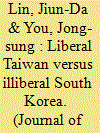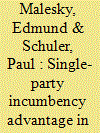| Srl | Item |
| 1 |
ID:
177620


|
|
|
|
|
| Summary/Abstract |
South Korea and Taiwan have developed very different sets of election campaign regulations. While both countries had highly restrictive campaign rules during the authoritarian era, they have diverged since democratic transition. South Korea still imposes numerous restrictions on campaigning activities, but Taiwan has removed most of the restrictions. We explore the causes of these divergent trajectories through comparative historical process tracing, focusing on critical junctures and path dependence. We find that incumbency advantage and containment of new opposition parties were the primary objectives of introducing stringent regulations under the authoritarian regimes in both countries. The key difference was that, during the democratic transition, legislators affiliated with the opposition parties as well as the ruling party in South Korea enjoyed the incumbency advantage but that opposition forces in Taiwan did not. As a result, the opposition in Taiwan fought for liberalization of campaign regulations, but the South Korean opposition did not.
|
|
|
|
|
|
|
|
|
|
|
|
|
|
|
|
| 2 |
ID:
171198


|
|
|
|
|
| Summary/Abstract |
Why do voters in single-party regimes express support for the ruling party in such large numbers? Scholars offer three sets of explanations: 1) Support is manipulated by regime leaders or falsified by frightened voters; 2) Support is due to genuine popularity or “performance legitimacy”; 3) The incumbent party holds an extreme incumbency advantage due to voters’ certainty about their candidates’ policy positions or access to state resources. Despite the impressive theoretical development in this literature, these arguments have not been subjected to a research design capable of examining the relative importance of each of these factors. We use a unique survey experiment on nearly 42,000 Vietnamese citizens over three years that reduces the threat of preference falsification and allows us to isolate voter's true preferences as much as possible. While we find some evidence for all three explanations, we find substantial support for incumbency bias. An important subset of Vietnamese voters—those inclined to vote for non-party candidates—sincerely favor the party under conditions of uncertainty about the candidates’ policy stances or experience in the legislature.
|
|
|
|
|
|
|
|
|
|
|
|
|
|
|
|